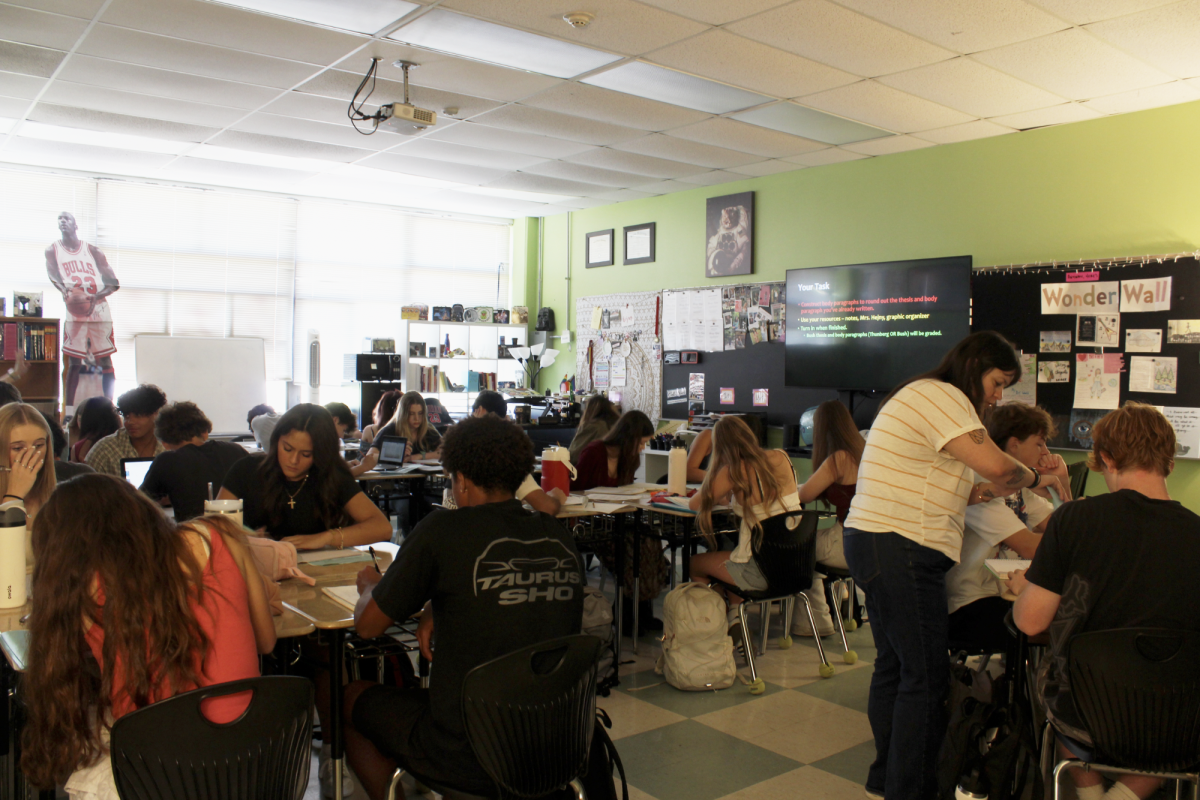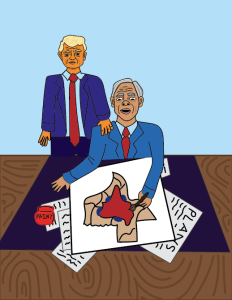Woman affected by shooting years later
Pictured is Susan Nelson.
April 25, 2018
Having a casual dinner at her friend’s apartment, Susan Nelson never would’ve guessed that in the next few moments she’d be held at gunpoint and shot. At 29 years old, her life shifted directions due to the events that occurred that night.
Her friend, Gary Rutherford, had taken in a 19 year old boy who needed a job and a place to live. The boy, Jason Dean, went through Rutherford’s belongings, found a gun which had not been safely stored and held them at gunpoint, demanding valuables. Nelson was shot in the shoulder as she stood to run, then shot in the back of the head as she turned.
“There is not a day that passes that I do not remember and think about it,” Nelson said. “That I do not miss my friend and grieve for his parents or [that] I don’t question, ‘Why me? Why did I live? What’s next? Am I OK?’ I have lots of questions.”
Dean was incarcerated and sentenced for life. Rutherford, who was also shot, died in the helicopter on the way to the hospital, and Nelson was in a coma for two weeks afterwards, awaking temporarily paralyzed.
“Because of my injuries, I was almost infant like,” Nelson said. “I would have to relearn almost everything: walking, talking, reading, writing, how to care for myself. I could not brush my own teeth, it was like starting my life over.”
Susan’s son, junior Elliott Nelson, believes her experience affected the way he was raised.
“Her experience has definitely affected our lives, because it gives me a first hand look at how much a gun can change a person’s life in a matter of seconds and gives me a sense of respect for how lucky I am,” Elliott said. “It also changed how I was raised, because my parents limited my exposure to violent video games, TV shows and movies, and my parents were very hands on.”
After a month in the hospital, Nelson moved in with her sister who got her accepted to a rehabilitation center, where she stayed for three months before transferring to a different center for another three months. Nelson was then released, although she continued therapy on her own, working with a private trainer and psychologist.
“I have, for many, many years, practiced walking, hiking and yoga for physical strengthening and meditation, breathing and mindfulness for their psychological benefits,” Nelson said. “I consider the physical effects the shortest term, though I still have balance, [speech] and fine motor skill issues. The mental, PTSD, and cognitive areas I work on every day.”
Nelson suffers from limited use of her left arm and hand, has headaches and eye spasms, and she often finds herself questioning her thought process, especially regarding reading and writing. Her husband, Christopher Nelson, notes the lasting effects being shot has had on her.
“Due to her head injuries, she often gets headaches and can be irritable,” Christopher said. “She is easy startled by loud noises, even now 25 years later.”
Following the shooting, Susan was inspired to write a book over her experience, titled the “The Only Light I Saw Was in Galveston.”
“After the incident I felt somewhat ashamed of what happened, that I now had a disability,” Susan said. “It took a lot of years, counseling, soul searching, meditation and strength to step into my own light and the new me. As a result of the book and the hard work I did, I now speak out, and I am very open to help others facing trauma recovery.”
Although prior to the shooting she had planned to become an actress, she became a board member of Texas Gun Sense, advocating for evidence-based common sense policies. She gives personal testimonies on the effects of gun violence, working as a liaison between the organization and lawmakers.
“I do not call it gun control; I do not think most people want to control other people’s guns,” Susan said. “I do think we need better policies that help protect everyone’s right to feel and be safe, those who choose to own a gun and those who do not. I do think being shot has made me more aware of the need for common sense legislation regarding these weapons, especially safe storage, training and mental health.”
Christopher is against assault rifles, considering them unnecessary for hunting or for home defense. He also advocates for safe storage of guns, influenced by his wife’s story.
“Another real issue for me, [that] would have possibly prevented what happened to my wife and what happens to so many young kids, is safe storage,” Christopher said. “All guns should be kept locked and unloaded so that they can’t be used by the wrong person. Too many young kids are shot and killed by their parents’ own gun or that of a friend’s parent due to not being stored properly.”
Elliott also feels as though reforms need to happen.
“I don’t believe we should take away all guns, but I do feel like we need to have restrictions on who gets access to guns and conduct background checks on gun buyers,” Elliott said. “I think we need to reform the systems that we have in place, which allow people to purchase unregistered guns without background checks in places like gun shows.”
Susan did not share her story with Elliott until she felt he was old enough to process it, and she feels her experience has affected how she raised him.
“Most parents are cautious and protective, but I think I am probably more mindful and worry more – more so regarding how he sees the world and deals with challenges or anger,” Susan said. “Myself having a brain injury, I question so much of my thought process that sometimes I probably work too hard at trying to do the right thing when it comes to parenting. My main goal would be for him to feel strong and confident and live without fear or regret.”








